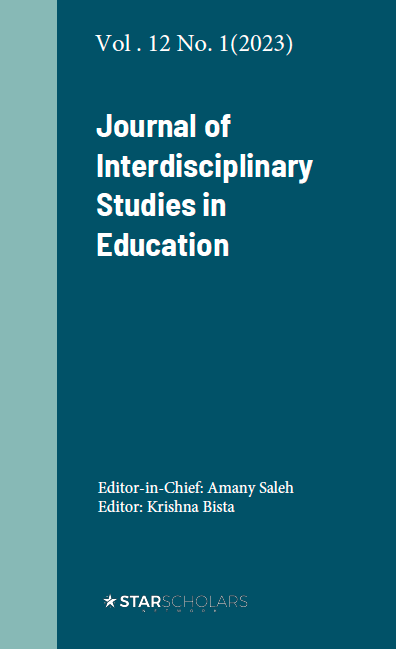English Language Teachers’ Professional Journey and Construction of their Identity
Keywords:
teachers' professional development, English language teaching, Professional Identity, communities of practiceAbstract
This study presents the trajectories of identity construction of three English language teachers from Nepal analyzing their storied life from school teachers to university professors employing three-dimensional professional development model forwarded by Padwad and Dixit (2014) to explore effective mediation by state agencies, culture and the policies, appropriate support from the organizations, and the bottom-up initiatives by the teachers in their professional development. Besides, professional journey derived from in-depth interview of the participants is analyzed employing Wenger's (1999) communities of practice, particularly engagement, alignment, and imagination, as theoretical categories to discover their professional identities. The analysis revealed that passion for language, creativity, and motivation to learn English language during childhood encouraged them to study English initially. In addition, inspiration from their teachers during their schooling and later a competitive working environment motivated them experiment with innovative approaches to teaching and establishing themselves in the profession. Furthermore, diversification in university teaching according to university requirements and resultant divergence from the professional root ultimately transformed their identity beyond English teachers. Finally, university policy, customization of teachers as per the university requirement, and their survival strategy as English teachers in a university where technical subjects are given priority have impacted their professional identities.
Downloads
References
Barkhuizen, G. (2016). A Short Story Approach to Analyzing Teacher (Imagined) Identities Over Time. TESOL Quarterly, 50(3), 655–683.
Clandinin, D. J., & Huber, J. (2010). Narrative inquiry. In B. McGaw, E. Baker & PP
Peterson. International encyclopedia of education.
Clandinin, D. J., Pushor, D., & Orr, A. M. (2007). Navigating sites for narrative
inquiry. Journal of teacher education, 58(1), 21-35.
Connelly, F. M., & Clandinin, D. J. (1990). Stories of experience and narrative
inquiry. Educational researcher, 19(5), 2-14.
Craft, A. (2002). Continuing professional development: A practical guide for teachers and
schools. Routledge.
Day, C. (2011). Uncertain professional identities: Managing the emotional contexts of
teaching. In New understandings of teacher's work (pp. 45-64). Springer, Dordrecht.
Diaz-Maggioli, G. (2004). Teacher-centered professional development. ASCD.
Eckert, P., & Wenger, E. (2005). Communities of practice in sociolinguistics: What is the
role of power in sociolinguistic variation? Journal of Sociolinguistics, 9(4), 582-589.
Farnsworth, V., Kleanthous, I., & Wenger-Trayner, E. (2016). Communities of practice as a
social theory of learning: A conversation with Etienne Wenger. British journal of educational studies, 64(2), 139-160.
Gee, J. P. (2000). Chapter 3: Identity as an analytic lens for research in education. Review of
research in education, 25(1), 99-125.
Koliba, C., & Gajda, R. (2009). “Communities of practice” as an analytical construct:
Implications for theory and practice. Intl Journal of Public Administration, 32(2), 97-135.
Miller, J. (2009). Teacher identity. The Cambridge guide to second language teacher
education, 172-181.
Negi, J. S. (2016). Teachers’ Professional Development to Enhance ELT: Needs Analysis for
Developing Teacher Training Program in an EFL Context. Journal of NELTA, 21(1-2), 40-53.
Norton, B. (2000). Identity and language learning: Gender, ethnicity and educational
change. London: Longman.
Padwad, A., & Dixit, K. (2014). Continuing professional development policy ‘Think Tank’:
an innovative experiment in India. The continuing professional development of English language teachers, 249.
Pennycook, A. (2004). Critical moments in a TESOL practicum. In B. Norton & K. Toohey
(Eds.), Critical pedagogies and language learning (pp. 327-346). Cambridge: Cambridge University Press.
Poudel, K. K. (2018). Transforming Foreign Language Grammar Classes through Teacher
Training: An Experience from Nepal. World Journal of Education, 8(1), 86-99.
Richards, J. C., & Farrell, T. S. C. (2005). Professional development for language teachers:
Strategies for teacher learning. Ernst Klett Sprachen.
Shrestha, P. (2011). The potential of mobile technologies for (English) language learning in
Nepal. Journal of NELTA, 16(1-2), 107-113.
Teng, F., & Teng, F. (2019). Teacher Identity in Foreign Language Education: From the
Perspective of Teacher Autonomy, Communities of Practice, and Affordances. Autonomy, Agency, and Identity in Teaching and Learning English as a Foreign Language, 47-63.
Webster, L., & Mertova, P. (2007). Using narrative inquiry as a research method: An
introduction to using critical event narrative analysis in research on learning and teaching. Routledge.
Wenger, E. (1999). Communities of practice: Learning, meaning, and identity. Cambridge
university press.
Wenger, E. (2010). Communities of practice and social learning systems: the career of a
concept. In Social learning systems and communities of practice (pp. 179-198). Springer, London.
Wenger, E. (2011). Communities of practice: A brief introduction.
Yadav, P. K. (2011). Blogging as a means of professional development for ELT
professionals. Journal
Additional Files
Published
Issue
Section
License
Copyright (c) 2023 Bharat Prasad Neupane

This work is licensed under a Creative Commons Attribution-NonCommercial-NoDerivatives 4.0 International License.







